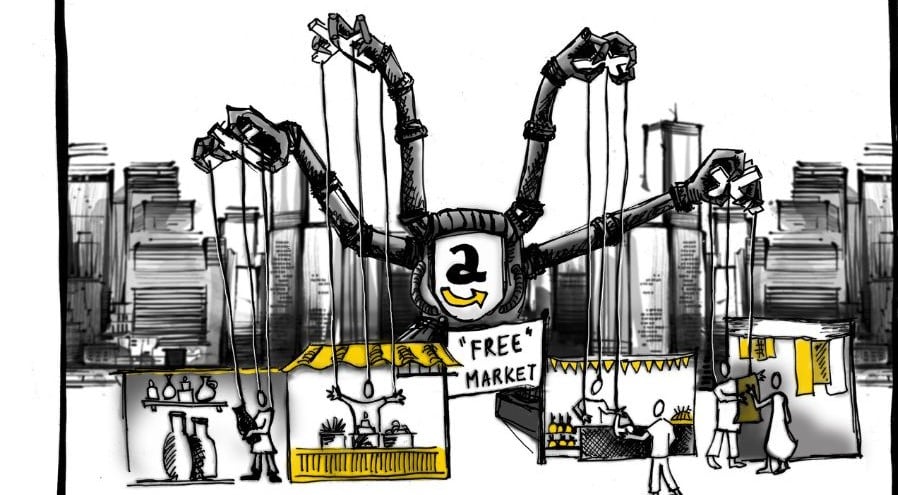Challenging Big Tech
Big Tech companies have become omnipresent in people’s lives and in the global economy. Big Tech’s monopoly power needs to be broken up and alternatives are urgently needed.
SOMO’s work seeks to expose and challenge the monopoly power of Big Tech to develop a just and sustainable digital economy. Working with European and global civil society networks, we want to catalyse a more democratic digital public sphere that serves the public interest, not just private profit.
Companies like Apple, Microsoft, Alphabet (Google), Amazon, and Meta (Facebook) have grown so much that we commonly call them “Big Tech”. The term describes a set of multinational corporations that have come to dominate the information and communication technology industry. These firms control entire markets, setting the rules for people, businesses, and sometimes even public services.
Today’s Big Tech companies have expanded by focusing on growth and scale at all costs under a “winner-takes-it-all” logic. They have relied on and exploited “network effects” and immense data collection to ensure an extensive network of consumers have no choice but to use their products. By doing so, they have developed monopoly power.
Big Tech firms provide and control the means for different communities to interact. For instance Facebook is the middleman between advertisers and social media users; Apple connects app developers and iPhone users; Amazon and Alibaba both link retailers and online shoppers.
This position as an intermediary, alongside its monopolisation strategies, allows Big Tech to collect rent from its users, either in fees or as data.
Highlighted Publications
-
How tech billionaires are killing internet for all Published on:
 Margarida SilvaPosted in category:Publication
Margarida SilvaPosted in category:Publication Margarida Silva
Margarida Silva
-
Amazon’s European chokehold Published on:
 Margarida SilvaPosted in category:Publication
Margarida SilvaPosted in category:Publication Margarida Silva
Margarida Silva
-
Fintech’s red flags Published on:
 Myriam Vander StichelePosted in category:Publication
Myriam Vander StichelePosted in category:Publication Myriam Vander Stichele
Myriam Vander Stichele
Challenging Big Tech’s digital monopolies
Our research has shown how Big Tech’s monopolisation strategy is reflected in its financial model:
• Its ability to extract rent has allowed these companies to reap above-average profit margins. In turn, these profits have led to the accumulation of vast financial assets (mainly offshore), complemented by access to cheap debt.
• The firms have been able to grow and reward shareholders simultaneously, primarily by raising share prices.
• The companies’ immense financial assets have enabled their expansion, clear from the ballooning value of their intangible assets, especially the premium paid during takeovers of other companies, also called “goodwill”.
The companies’ expansionist strategies have made them nearly unavoidable. For instance, Amazon has become so dominant that it can get away with exploitative behaviour towards the independent sellers that depend on its platform. Alongside their multiple and conflicting roles, this enables Amazon to charge more fees, extract business data, squeeze smaller sellers, and impact local economies.
Monopoly and rentier power
As Big Tech platforms build their monopoly market power, it allows them to exploit their role as so-called gatekeepers of digital infrastructures to make a profit. They impact the economy as a whole, the way people do business, their rights as employees and consumers, and the choices they can exercise.

Tackling monopoly power via mergers and acquisitions
These takeovers have been crucial for Big Tech’s market domination. The US Big Tech firms made more than 1,000 acquisitions in just 10 years. This shopping spree has enabled Big Tech to take over emerging competitors, acquire innovative technology and know-how, and expand into a wide range of business sectors – from health to education to food distribution.
These deals can have hugely negative impacts. For instance, Amazon’s US$ 1.7 billion takeover of robot vacuum maker iRobot at once threatens people’s privacy in their own homes and further strengthens Amazon’s dominance in smart home devices and e-commerce.
Competition authorities worldwide have mostly waved these deals through with little scrutiny. We are working with partners around the world to reform the rules and to strengthen their enforcement.

Tech’s expansion into Fintech
Big Tech companies have leveraged their position, wealth and takeover strategy to expand into crucial sectors such as health and finance. Big Tech’s success is also praised as the inspiration for the digitalisation and increasing domination over other companies.
In finance, for instance, the digitalisation of financial services – such as online payment services, data-driven insurance products, stock investment apps, or even cryptocurrency – has led to the emergence of the fintech industry.
However, there are increasing concerns regarding fintech products and services. SOMO’s research has highlighted some worrying red flags in this sector, including:
- its reliance on extreme data collection and the personalisation of financial products, which can be discriminatory;
- the difficulty of scrutinising the automated decision-making behind crucial financial decisions;
- new risks of exclusion due to the reliance on technology and the systems’ volatile nature;
All of these issues are exacerbated by minimal regulatory checks within the industry.
Big Technology companies’ expansion into financial services further threatens to solidify their monopoly market power, increase their control over data, and lead to the deterioration of financial services.
-
Fintechs Red Flags (pdf, 9.96 MB)
Breaking up Big Tech’s monopoly and rentier power
Big Tech’s monopoly power has real consequences. It has enabled the big tech companies to impose corporate surveillance, set unfair trading practices for smaller businesses, and create systemic risks for democracy.
It is clear that Big Tech’s monopoly power needs to be reined in. In the short term, this means more control over mergers and acquisitions, effective diligence laws, and stronger protections for the consumers, workers, and smaller companies that have become dependent on the platforms.
However, tackling the root problem over the long term will be more challenging: reining in Big Tech’s power will require more ambitious structural solutions that break up the company’s monopoly hold on the economy.
We are calling for investment policy approaches from governments to encourage digital infrastructure that is in the public interest, as well as promoting alternatives to the Big Tech platforms.

Do you need more information?
-

Margarida Silva
Researcher -

Rodrigo Fernandez
Senior researcher
Latest updates
-
 Amazon’s chokehold over online shopping in the EU and UKPosted in category:News
Amazon’s chokehold over online shopping in the EU and UKPosted in category:News Margarida SilvaPublished on:
Margarida SilvaPublished on: -
 Fintech is expanding – and so are the risksPosted in category:News
Fintech is expanding – and so are the risksPosted in category:News Myriam Vander StichelePublished on:
Myriam Vander StichelePublished on: -
How Big Tech is becoming the GovernmentPosted in category:Opinion
 Rodrigo FernandezPublished on:
Rodrigo FernandezPublished on: Rodrigo Fernandez
Rodrigo Fernandez
Related Topics
Discover more of SOMO’s work and publications.




